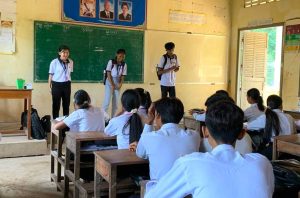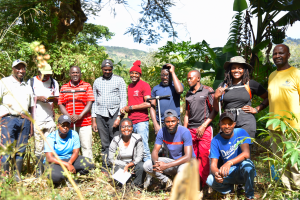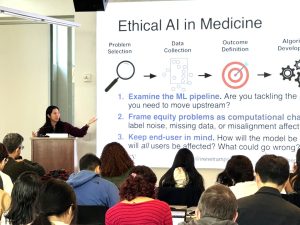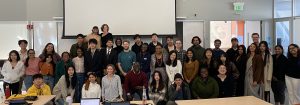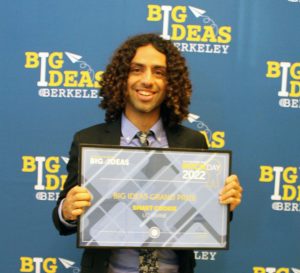
BERKELEY, May 6, 2022 – In its annual Grand Prize Pitch Day and Awards Celebration on May 4, judges of the UC-wide Rudd Family Foundation Big Ideas Contest awarded the 2022 Grand Prize to the “SMART Cookies” project from UC Irvine, a community-based solution to iron-deficiency anemia. The Grand Prize award winner takes home $10,000 on top of any earlier awards earned in the past year.
SMART Cookies is the brainchild of UCI fourth-year medical student Daniel Haik and Ghanaian partners from Kwame Nkrumah University of Science and Technology, Dr. Marina Aferiba Tandoh and Abigail Owusuaa Appiah. Through this collaboration, their team has developed “a bioavailable, plant-based, iron-supplemented biscuit” made from turkey berries, a tropical fruit packed with iron, antioxidants, and vitamins A and C. In a randomized, controlled trial at a school in Ahafo, Ghana, the fortified biscuits were found to be far more effective than a UNICEF initiative similarly aimed at lessening iron-deficiency anemia in adolescent girls.
“Working with Big Ideas introduced our team to a vast network of experts in international development economics and clinical trial design in the earlier stages of our growth,” said Haik. “Their support will enable our team to begin a nationwide distribution of SMART cookies, which is a dream come true.”
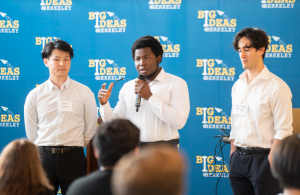
The other big winner of the night was the Madojo team, inventors of a blockchain-certified recruiting platform enabling Nigerian students to close the gap between job seekers and employers. They won the inaugural Binance Charity — LIFT Initiative Award. Binance Charity and the Lab for Inclusive FinTech (LIFT) have partnered with Big Ideas to nurture students and young social entrepreneurs working on Fintech and Blockchain solutions that promote legitimacy, humanitarian relief, financial health, gamification solutions, and workforce development, among many others. The Lab for Inclusive FinTech (LIFT), established with generous support from Ripple Impact and Binance Charity, is a research partnership led by IBSI aiming at unlocking the potential of digital financial technologies to benefit underserved populations around the world. LIFT has three major thrusts: research, experiential learning, and community building.
“This is only the beginning for Madojo,” said Victor Inya Okoro, a Master in Development Engineering student on the all-MDevEng Madojo team. “We plan to use the network we built during the program to continue to iterate on our idea, and the funding will help us get started in the right direction.”
Other Grand Prize finalist teams included UC San Diego’s Algeon Materials, creating biodegradable and sustainable bioplastics from kelp to replace traditional petroleum-based packaging; the Foot Powered Cooler from UC Davis, a low-cost, energy-efficient cooling system designed to reduce post-harvest food losses at marketplaces in Uganda; and Carbon Pricing DAOs from UC Berkeley, a decentralized autonomous organization tool that enables the most accurate and scientifically rigorous pricing of carbon.
Of nearly 200 Big Ideas applications received last fall — from 700 grad and undergrad students representing every University of California campus and more than 70 disciplines — 16 finalists were selected in February, across the Social Impact Tracks of Global Health, Food and Agriculture, Financial Inclusion, Energy and Resources, Education and Literacy, Cities and Communities, Data and AI, and Art and Social Change.
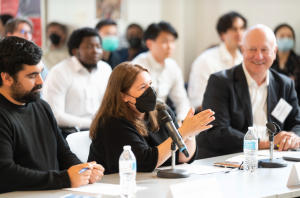
“The multidisciplinary focus was incredible — all of the finalists harnessed the power of their teammates to provide powerful solutions,” said Rhonda Shrader, Executive Director of the Entrepreneurship and NSF I-Corp program at Berkeley Haas School of Business and one of three Grand Prize judges. “So inspiring to see the energy, imagination and connectivity across all of the UCs — we’re stronger together.”
Founded in 2006 at UC Berkeley, and managed by the Blum Center for Developing Economies, Big Ideas has grown from an annual contest at Berkeley to an innovation ecosystem that serves students at all 10 campuses across the University of California, with year-round programming including industry and alumni speakers and mentors, toolkits, and courses and workshops on innovation and social entrepreneurship. Over its history, Big Ideas has supported over 3,000 innovations, involving more than 9,000 students, and awarded $3M in funding to 500 winning projects that have gone on to secure approximately $1B in additional funding.

